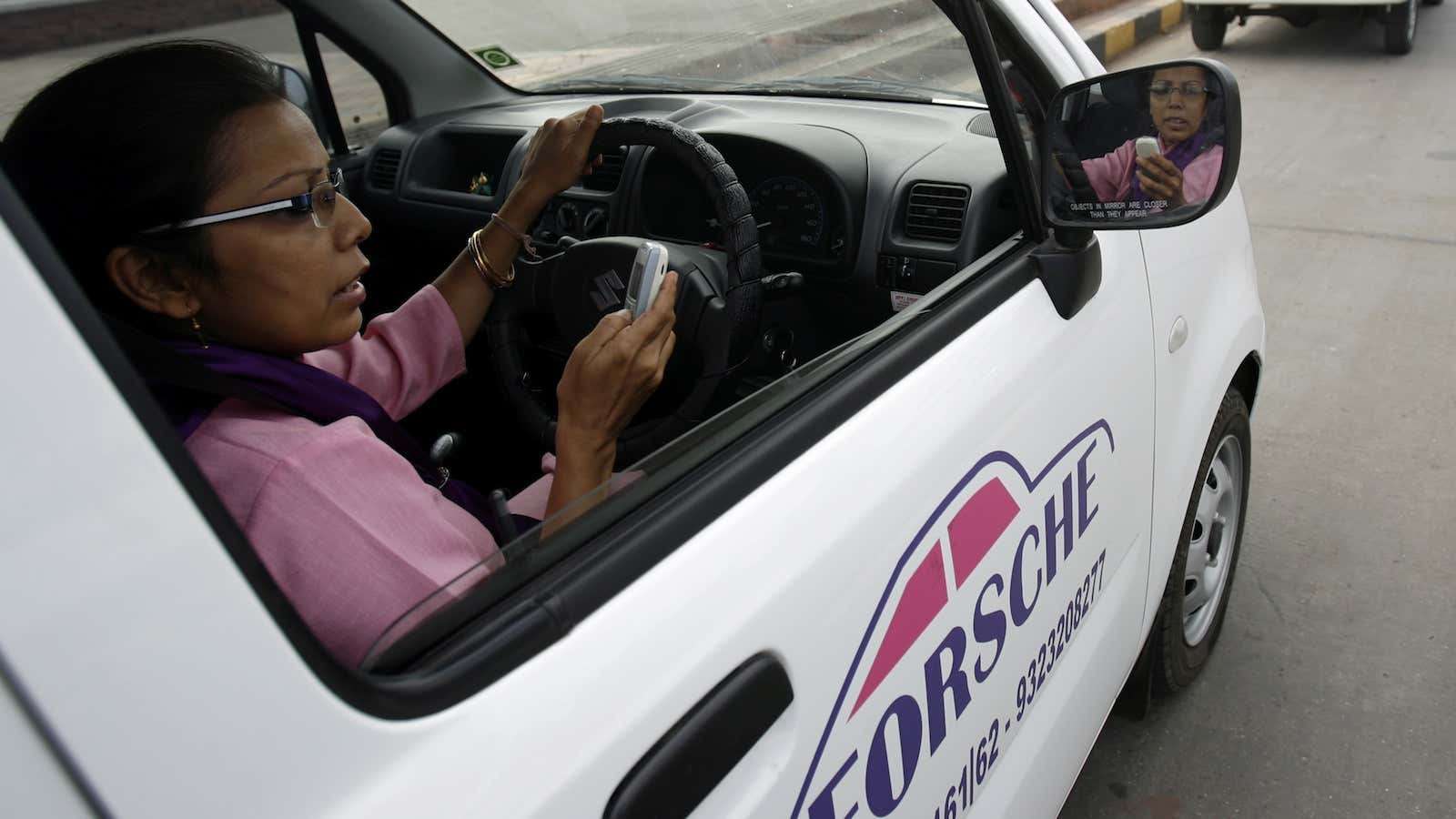These are some of the responses to expect when trying to order a woman-driven taxi cab in Mumbai. That is, when the phone actually connects:
“Can I call you back in an hour’s time, ma’am?”
“I have no such service.”
“Let me put you on hold.” Click.
After an Uber taxi driver was accused of raping a female passenger in Delhi last week, women in India were forced to reconsider the online cab-booking services that many rely on for safe commutes, especially after daylight hours.
Amid this threatening backdrop, the “for women, by women” cab companies introduced over the past few years were expected to be one solution to combat that kind of sexual violence.
Brands like SheCabs, Priyadarshini Taxi Service and Viira Cabs have cropped up over the past five years to meet the demand of solo women travelers in Indian cities, with the added benefit of employing more women in a male-dominated market.
But few have managed to stay afloat, or grow their companies enough to make an impact.
Slow growth
In Delhi, home to both the Uber incident and the Nirbhaya bus rape of 2012, there is just one service tailored for women customers. Sakha Consulting Wings, a social enterprise linked with non-profit Azad Foundation, was launched in 2010 to provide opportunities to female drivers—and help women passengers.
Sakha is not an on-call taxi service like Meru or Uber, but rather a specialty service for either private customers or companies geared for longer trips. They currently employ 19 women who receive a 14-part training through Azad Foundation and drive an air-conditioned vehicle with GPS.
Nayantara Janardhan, a director at Sakha, said the company’s growth has been gradual and dependent on the number of trained female drivers. She said the lack of training facilities and responsibilities at home can hold women back from this profession.
“Women have to fulfill more family expectations—attend to tragedies, rituals. Sometimes they are the only ones at home that fill the water that comes at a certain time,” she said.
But Revathi Roy, founder of India’s first female cab company Forsche, said that the slow growth for these companies has more to do with money than the gender divide.
After working as an independent taxi driver for 10 months, Roy developed the idea for now-defunct Forsche in 2007 and eventually created a training academy for women below the poverty line to learn how to drive, which has trained around 1,000 people.
No foreign investors
Unlike popular radio taxi companies like Meru or Easy Cabs that can afford to buy 500 cars at a time, Roy said women-centered taxi services start with minimal seed money and capital, operating more like non-profits or social enterprises than business ventures. That’s true of both Sakha and Priyadarshini, a Mumbai-based taxi company started by Susieben Shah, a politician, that currently operates with 25 cars.
“We were the first ones to get recognition. We were the first to get a platform. But we didn’t get that kind of investment,” Roy said.
Without the capital, several companies have disappeared—or remained too small to compete with a regular, and often more reliable, rival. Call up Viira Cabs (also started by Roy) and Mumbai Gold Cabs and you might just listen to a phone ring until you hang up. And none of the companies have launched mobile apps to attract more business.
More expensive
The lack of scale has impacted the cost of service. Mumbai-based Priyadarshini charges Rs250 for the first 10 kilometres and Rs21 per km after that. Ola Mini, on the other hand, charges only Rs15 per km.
Even so, Roy said the Uber incident in Delhi only reinforces what she knew in 2007: India wants, needs, and will eventually have more women taxi drivers. And some state governments seem to agree.
Maharashtra has reserved driving permits for women taxi drivers, and lowered the price to half of the usual Rs3 lakh fee. And in November of 2013, Kerala’s Social Justice Department went one step further to launch She Taxi, a 24-hour women-only taxi service.
She Taxi now has expanded to 35 taxis total, operate in both Trivandrum and Cochin, and serves about 40 passengers per day, said Neethu T. D., a project coordinator with the department.
“We clearly see a vertical trend of growth in the freedom of women who travel at night for various purposes,” she said.
“I don’t get scared”
Savita Tomar, a 22-year-old taxi driver with Sakha Consulting Wings, said that the freedom extends to both the driver and the passenger.
Tomar said she drives between five and 10 hours a day, and often overnight because “that’s when women need us the most.” The Delhi native has been driving for five years, and earns between Rs7,000 to Rs15,000 a month driving at Sakha.
“I don’t get scared—I’ve been doing this for five years,” she said.
That doesn’t mean she drives without extra precaution. Tomar learned martial arts through her training with Azad Foundation, and carries pepper spray with her at all times. The GPS in the cars at Sakha are also fixed with a panic button so that drivers can be tracked and reached in case of an emergency.
“Sometimes people say why are you doing this, it’s a dirty job,” she said. “But I think more women need to be out on the road.”
For Roy, it was driving a taxi as a woman that gave her confidence—and helped earn the respect of other drivers and the community. For women from low-income backgrounds who learn how to drive, she said, their new profession is perceived as a step up on the social ladder compared to working as a maid or peon.
“They have a lot of importance,” she said. “And they give a lot of importance to what they do.”
